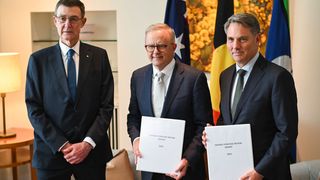The government’s new Defence Strategic Review has been rightly considered the greatest shift in Australian national security thinking since the Paul Dibb review in the 1980s. This time, however, the strategic environment is even more severe.
The Soviets had the intent to undermine the US-led regional order in the 1980s, but they did not have the means. China today has both. The only question is how much risk Beijing is willing to take connecting its means to its ends – and the evidence suggests Xi Jinping is willing to take a lot more risk than his predecessors. This is not a world in which Australia can protect its security and sovereignty through business as usual.
I have led similar strategic reviews myself in the US – in the White House and for the congress – and have been a student of other countries’ national strategies. This one ranks among the clearest I have seen anywhere in terms of defining the problem and then putting forward new concepts to defend the nation. When historians look back on this period, they will focus on Shinzo Abe’s 2013 National Security Strategy of Japan and the Albanese governments 2023 DSR as the bookends that defined how American allies prepared for a world of declining relative American power and unwelcomed Chinese hegemonic ambitions.
When states like Australia or Japan face such a deteriorating external environment, they have three basic choices. They can do what scholars call “bandwagoning” – essentially defecting to the aspiring hegemon despite the negative impact on traditional definitions of sovereignty, values, and interests. There are some loud voices in Australian politics advocating this, but they are not influential with government or the public (though Beijing clearly appreciates their efforts).
The second option is to increase “internal balancing” or the ability to unilaterally deter the rising power from using force by threatening to hurt it if it tries. The most extreme way to do this would be through the development of nuclear weapons, but Australia is too connected to the global rules-based order to pursue such a rogue option. Instead of pursuing deterrence through punishment (the ability to devastate the other side’s homeland), the Review proposes the more reasonable track of deterrence through denial, which means deploying systems to frustrate adversaries’ ability to approach and attack.
This is purely defensive. But it requires the DSR’s recommended shift from a “balanced force” that could operate anywhere from East Timor to Afghanistan towards a “focused force” that prioritises national defence of the homeland. Put another way, adversaries in the Middle East may have been impressed with armoured vehicles and heavy artillery Australia brought to coalition operations, but the People’s Liberation Army was not. However, the PLA will be impressed by Australia’s plan to deploy nuclear-powered attack submarines, ballistic missiles and other capabilities that would put at risk any force threatening the maritime approaches to Australia.
Internal balancing is not just about military capabilities, though. It is also critical that a nation organises to compete in a tougher environment by establishing an “all of government” approach with greater unity of effort. Put differently, the quality of how national instruments of power are used matters as much as the quality. This was at the core of Abe’s 2013 National Security Strategy and why Japan established an NSC and more jointress of military, technology and economic policies. The DSR puts great weight on unity of effort, including statecraft and technology development. Often defence strategic reports will tell the rest of the government how they fit in national security strategy and the diplomats fail to take note.
However, Foreign Minister Penny Wong’s speech at the National Press Club last week indicated to me that the Department of Foreign Affairs and Trade not only gets it, but shaped the strategy and has the cabinet’s support to put statecraft as the first tool in Australian interaction with the world, as it should.
There is a third way to restore a more favourable strategic environment beyond bandwagoning and internal balancing, and that is through external balancing – or the strengthening of alliances and partnerships to confront potential adversaries with a thicker web of relationships and therefore military, diplomatic and economic consequences if force is used.
Beijing would call this “containment” but nations such as Australia, Japan, or even the US still seek stable and indeed lucrative relationships with China in contrast to the almost non-existent economic relationships that existed with the Soviet Union under the Cold War containment strategies.
Moreover, the Indo-Pacific region lacks anything like the collective security of NATO, which confronted the Soviets and Warsaw Pact in Europe during the Cold War. Instead, Australia is able to pursue an array of minilateral arrangements such as the Quad with India, Japan and the US in addition to growing bilateral security partnerships with Japan, India and now Korea.
These opportunities for security co-operation are expanding for Australia for two reasons: first, because Beijing’s actions are making this mutual support more attractive, and second because Washington welcomes it. Not surprisingly, the DSR is playing very well in Washington, Tokyo, Seoul and Delhi.
And ultimately internal balancing, national defence and deterrence by denial would all be very challenging for Australia without the alliance with the US. The new approach proposed in the DSR will increase Australia’s sovereign choices and independent deterrence capabilities but will require American technology.
Despite some frustrating aspects of the US export control system, the Biden administration, the congress and the American public (according to USSC surveys) are all strongly supportive of assisting Australia with building those sovereign capabilities – as are the American public and political elite when it comes to Japan, Korea and India.
Moreover, because Australia is not choosing deterrence by punishment, the ultimate guarantor that adversaries attacking Australia could face devastating consequences at home will remain the US and its offensive capabilities and nuclear deterrent.
There is broad consensus on the need to support allies and push back against China in the US, but Washington is also tugged in multiple directions by Ukraine and divided government at home. There is therefore greater clarity in the DSR than the Biden administration has mustered for many of its strategic documents. But in that clarity is the opportunity for Australia to shape American strategic planning for the benefit of both allies and the region overall.






